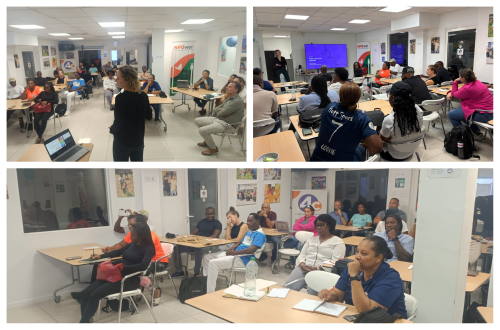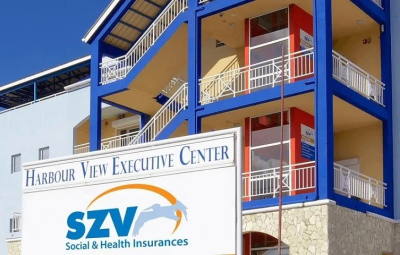 PHILIPSBURG:--- Member of Parliament Egbert Doran has formally requested a comprehensive update from the Minister of Education, Culture, Youth & Sport (ECYS), Melissa Gumbs, regarding the current operational readiness and capacity of the nation’s public education system.
PHILIPSBURG:--- Member of Parliament Egbert Doran has formally requested a comprehensive update from the Minister of Education, Culture, Youth & Sport (ECYS), Melissa Gumbs, regarding the current operational readiness and capacity of the nation’s public education system.
The inquiry, submitted on Tuesday, focuses on ensuring that progress in school infrastructure, ICT integration, and staffing levels remains on track to meet the demands of the 2026 academic year and the upcoming hurricane season.
“Public education requires constant and vigilant oversight,” MP Doran stated. “As we move forward, it is essential that both Parliament and the public are kept informed on how our schools are evolving to meet modern standards. Transparency is not only about identifying gaps, but about safeguarding the continuity of quality education for our children.”
Infrastructure and Digital Equity
MP Doran’s letter requests a status report on school maintenance and the reliability of ICT connectivity for teaching, assessments, and school administration. He emphasized that as education becomes increasingly digital, classroom infrastructure must be reliable, resilient, and consistently maintained across all campuses. “As a former public school student, I understand firsthand the impact that the school environment has on a child's ability to succeed,” Doran added.
Staffing and Campus Access
The MP is also seeking confirmation that all public schools are meeting their full staffing requirements, including qualified educators and essential support personnel. Additionally, he requested clarification on reports concerning a ministerial decree related to campus visits.
“Our schools function best when security is balanced with transparency and engagement,” Doran noted. “Policies governing school access must be clear and must not inadvertently hinder parental involvement or broader community engagement.”
Policy Direction and Preparedness
With the 2026 hurricane season approaching, MP Doran highlighted the dual role of schools as learning institutions and emergency shelters. He requested an update on the structural integrity of school buildings and the status of emergency protocols and preparedness measures.
He further sought clarity on whether any discussions are underway regarding potential shifts toward the privatization of public education.
“Public education is a cornerstone of our society,” Doran stated. “Any significant changes to its governance or structure must be approached with extreme care and absolute transparency to ensure it remains accessible to every child.”
MP Doran indicated that his request is aimed at ensuring continuity, accountability, and proactive planning, and he looks forward to a timely and constructive response from the Minister so that these national priorities can be addressed effectively.
 PHILIPSBURG:--- Last Friday, the Foresee Foundation successfully launched its first workshop of 2026 in collaboration with the Sint Maarten Sports Federation (SMSF) and
PHILIPSBURG:--- Last Friday, the Foresee Foundation successfully launched its first workshop of 2026 in collaboration with the Sint Maarten Sports Federation (SMSF) and PHILIPSBURG:--- SZV Social & Health Insurances will officially launch ‘Senior Priority Hours’ on Wednesday, January 28, 2026, a new service designed to improve accessibility and client support for persons aged 60 and above.
PHILIPSBURG:--- SZV Social & Health Insurances will officially launch ‘Senior Priority Hours’ on Wednesday, January 28, 2026, a new service designed to improve accessibility and client support for persons aged 60 and above. PHILIPSBURG:--- Minister Patrice Gumbs of the Ministry of Public Housing, Spatial Planning, Environment and Infrastructure (VROMI) has issued a statement that demolition has commenced and will continue on Soualiga Drive, Pond Island. Occupants of the land were informed in September that they needed to vacate by December. Though the original demolition timeline was slated for early December, the recent holiday period was considered, which resulted in the date being postponed to January 8th, then again postponed, and finally executed. Although notice of the demolition was given in September, construction was observed to continue in October, prompting stop/removal orders that were also ignored.
PHILIPSBURG:--- Minister Patrice Gumbs of the Ministry of Public Housing, Spatial Planning, Environment and Infrastructure (VROMI) has issued a statement that demolition has commenced and will continue on Soualiga Drive, Pond Island. Occupants of the land were informed in September that they needed to vacate by December. Though the original demolition timeline was slated for early December, the recent holiday period was considered, which resulted in the date being postponed to January 8th, then again postponed, and finally executed. Although notice of the demolition was given in September, construction was observed to continue in October, prompting stop/removal orders that were also ignored.